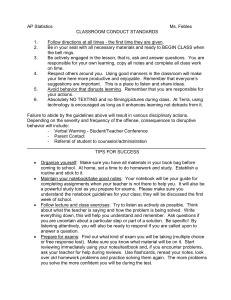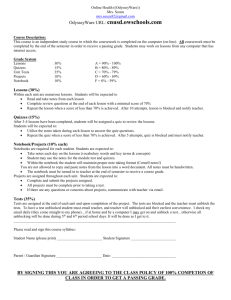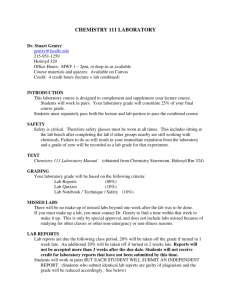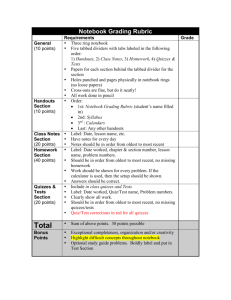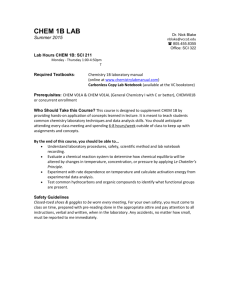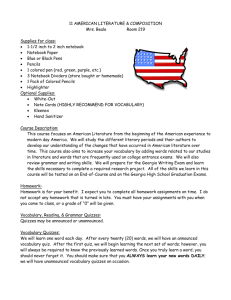Syllabus - Brian Lamp - Truman State University
advertisement
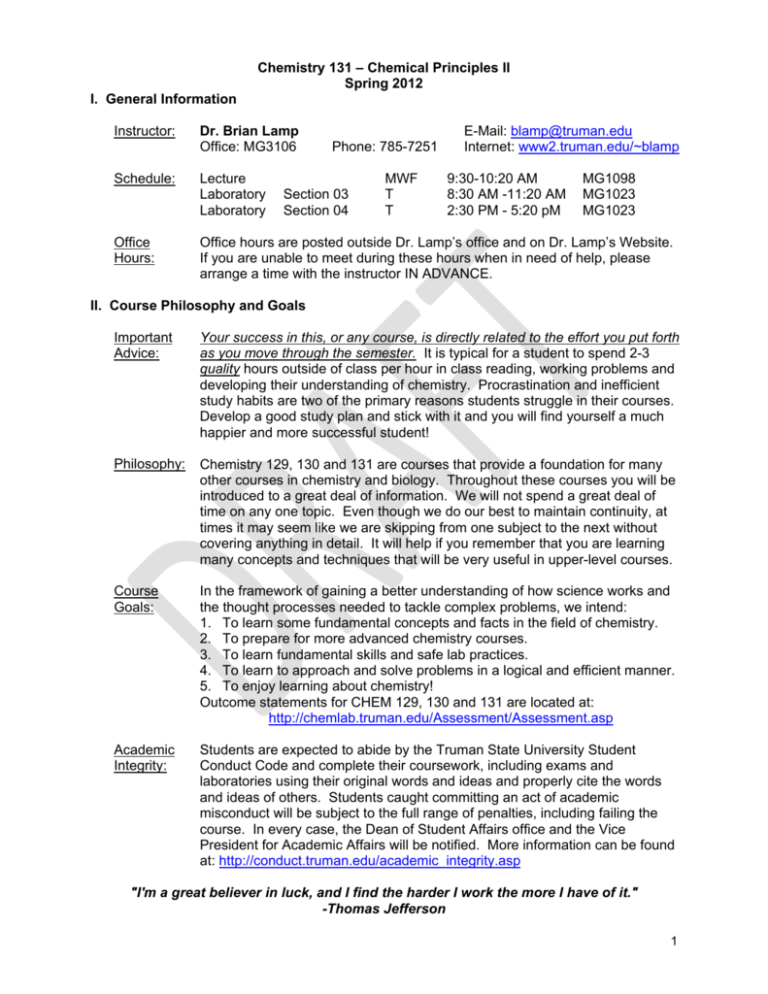
Chemistry 131 – Chemical Principles II Spring 2012 I. General Information Instructor: Schedule: Office Hours: Dr. Brian Lamp Office: MG3106 Lecture Laboratory Laboratory Phone: 785-7251 Section 03 Section 04 MWF T T E-Mail: blamp@truman.edu Internet: www2.truman.edu/~blamp 9:30-10:20 AM 8:30 AM -11:20 AM 2:30 PM - 5:20 pM MG1098 MG1023 MG1023 Office hours are posted outside Dr. Lamp’s office and on Dr. Lamp’s Website. If you are unable to meet during these hours when in need of help, please arrange a time with the instructor IN ADVANCE. II. Course Philosophy and Goals Important Advice: Your success in this, or any course, is directly related to the effort you put forth as you move through the semester. It is typical for a student to spend 2-3 quality hours outside of class per hour in class reading, working problems and developing their understanding of chemistry. Procrastination and inefficient study habits are two of the primary reasons students struggle in their courses. Develop a good study plan and stick with it and you will find yourself a much happier and more successful student! Philosophy: Chemistry 129, 130 and 131 are courses that provide a foundation for many other courses in chemistry and biology. Throughout these courses you will be introduced to a great deal of information. We will not spend a great deal of time on any one topic. Even though we do our best to maintain continuity, at times it may seem like we are skipping from one subject to the next without covering anything in detail. It will help if you remember that you are learning many concepts and techniques that will be very useful in upper-level courses. Course Goals: In the framework of gaining a better understanding of how science works and the thought processes needed to tackle complex problems, we intend: 1. To learn some fundamental concepts and facts in the field of chemistry. 2. To prepare for more advanced chemistry courses. 3. To learn fundamental skills and safe lab practices. 4. To learn to approach and solve problems in a logical and efficient manner. 5. To enjoy learning about chemistry! Outcome statements for CHEM 129, 130 and 131 are located at: http://chemlab.truman.edu/Assessment/Assessment.asp Academic Integrity: Students are expected to abide by the Truman State University Student Conduct Code and complete their coursework, including exams and laboratories using their original words and ideas and properly cite the words and ideas of others. Students caught committing an act of academic misconduct will be subject to the full range of penalties, including failing the course. In every case, the Dean of Student Affairs office and the Vice President for Academic Affairs will be notified. More information can be found at: http://conduct.truman.edu/academic_integrity.asp "I'm a great believer in luck, and I find the harder I work the more I have of it." -Thomas Jefferson 1 III. Required Materials Textbook: "General Chemistry", 9th Ed., Petrucci, Harwood, Herring, and Madura, 2007. Laboratory Manual: The laboratory manual for Chemical Principles, as well as other lab information is online at http://chemlab.truman.edu. Laboratory Notebook: A permanently bound laboratory notebook capable of creating duplicate pages is required. You must have this notebook by the first lab. Safety Glasses: All students are required to have departmental approved safety glasses or goggles for use in the laboratory. Laboratory Attire: Proper lab attire will be required at ALL lab sessions. In addition to safety glasses, you must always attend lab wearing long pants, close-toed shoes, and a shirt that covers the upper body (at least equivalent to a tee-shirt). Inappropriately attired people will not be allowed in lab. Calculator: You must have a hand-held scientific calculator capable of scientific notation for use on homework problems, quizzes, and exams. It will be assumed that you have a calculator for all quizzes and exams. The instructor will not loan calculators to students who have none. Attendance etc. : It is expected that everyone will attend class and participate. Although attendance is not mandatory, roll will regularly be taken. Attendance records are a factor in determining borderline grades at the end of the semester. IV. Lecture Coverage: The lecture portion of the course will explore and elaborate on topics presented in the text. It does not make sense for me to repeat all of the material in the text. I will introduce topics and elaborate on points that are particularly essential or challenging. I expect you to read all of the chapters that we cover and to ask questions about what you read. Exams: Four in-class exams worth a total of 400 points will be given. Tentative dates for these exams are: February 3 (F), February 29 (W), March 30 (F), April 25 (W) A comprehensive final exam will be given Friday, May 4 from 7:30 - 9:20 AM. The final exam will be worth 200 points. Homework & Quizzes: Regular homework assignments will be given to be worked individually or in groups, but may not be graded. While working in groups to solve problems is very helpful, the result is usually a "group" assignment that does not adequately reflect whether you learned the material. Instead of graded homework, we will have weekly quizzes of 15-20 minutes. These quizzes will be given the last 20 minutes of class each Friday (except for weeks we have an exam). The questions for the quizzes will be taken directly, or with slight alteration, from the assigned homework. Your reward for doing your homework conscientiously should be good performance on these quizzes. Mobile Devices: Unless you are an emergency responder, all cell phones, ipods and pagers must be turned off and stored while in lecture. Failure to do so will result in dismissal from the class session (this includes exams). This policy includes texting. 2 IV. Laboratory Laboratory Philosophy: Experimentation is at the heart of chemistry. The vast majority of the new knowledge in chemistry comes from careful examination and interpretation of experimental results. In order for you to have confidence in you results, it is important that the experiments be executed carefully and properly. The laboratory is designed to teach you lab skills, reinforce concepts from lecture, and show you how to think about scientific problem solving. The importance of lab is reflected in the fact that it counts for about 25% of your final grade. Lab Notebooks: The purpose of a research lab notebook is to enable you or any other worker to understand your experiment and duplicate your work. Although we are not operating in a research environment, our goal is to reinforce the habits that will make you a better scientist in the future. You are required to maintain a permanently bound and numbered lab notebook, capable of making duplicate pages that will be handed in for grading. Before coming to lab you should familiarize yourself with the theory, techniques, and safety precautions for the experiment. I expect all students to come prepared for lab. If I see instances of students who appear to be reading the lab for the first time during class, I will ban lab manuals from the laboratory. Lab notebook guidelines can be found at: http://chemlab.truman.edu/Notebook_Files/LabNotebook.asp. You must have all the information necessary to do the lab written in your notebook before class. This includes a statement of purpose of the experiment, background section, outline of the procedure that will be followed, and blank data tables if necessary. Failure to come prepared will result in a loss of points. All results and observations must be written directly in the notebook, students who make temporary entries on random pieces of paper or paper towels will find them vanishing (the papers, not the students!). Other guidelines/rules: • Always write in your notebook in PEN, not pencil! • Mistakes in the lab notebook should be crossed out with a single line. Whiteout, etc is not acceptable. • All pages must include your name (printed), signature and date completed. • Your notebook must have an up-to-date table of contents on the first page. • Computer-generated tables and graphs are encouraged where appropriate. Such material must be inserted permanently into the notebook with a copy on both the original and carbon copy page. The filename for the material must be recorded in notebook as well. • If you are working in a group and only one member of the group records data at the time of the experiment, you must indicate in your notebook that the original results were copied from the other person's notebook. Give the page number of the original results. • The Discussion and Conclusions section must be typewritten, printed, and affixed to both the original and carbon copy page. Each student must write his or her own discussion and conclusions. A score of zero will be awarded for lab reports with duplicate discussion and conclusion sections. Lab Grading: Lab performance has a major bearing on your overall course grade. You will be awarded 5 points for arriving at lab with an appropriately prepared lab notebook and 5 points for successfully completing each experiment and turning in a lab report. Five of these reports will be graded for 25 points each. The Environmental Chemistry lab will be graded as a 50 point “project”. 3 VI. Grading Grade point Letter grades will be determined based on the percentage derived from the breakdown: breakdown shown below. Grade Point Distribution Source Total Points 4 Exams 400 pts. maximum 9 Quizzes 200 pts. maximum (drop lowest) Final Exam 200 pts. maximum Misc. and Group Assignments 100 pts. maximum 10 Experiments 100 pts. Environmental Lab 50 pts. 5 Lab Reports 125 pts. . Total points 1175 pts. maximum Grading Scale: Awarding of final class grades will be based on a 90-80-70-60 scale. Percentages will be based on the total possible points for the semester. I reserve the right to lower the grading scale, but it will never be raised. Late Hand-ins: No late work will be accepted. All assignments will be given a specific deadline, anything turned in after the deadline will earn a score of zero. Make-ups: No make-up exams, quizzes, or labs will be given without prior approval. If you cannot attend a scheduled exam for a valid, instructor-approved reason, notify Dr. Lamp IN ADVANCE and an arrangement will be made. No credit will be given for missed labs, exams or quizzes without prior instructor approval. Valid reasons include traveling with a University-sponsored organization, illness, or death in the family. If a sudden, unexpected event occurs that causes your absence, contact the Student Affairs Office and they will contact me. Also, please leave a voice or e-mail message for me and contact me immediately upon your return. VII. Other Information All assignments in lab and lecture must be written legibly and in a well-organized fashion. If an answer or work cannot easily be interpreted, no credit will be given. All mathematical work and assumptions used when solving a problem, whether on homework, quizzes or exams, must be shown in order to receive credit for the problem. Please mark your answers clearly. Trim edges of spiral notebook paper and staple multiple sheets prior to submission. A 10% penalty will be deducted for failure to do this! Do not procrastinate!!! Your understanding of lecture material, and grades on homework and exams will be adversely affected by this approach. I strongly recommend that you work ahead on reading and homework and participate fully in classroom discussions and problem solving sessions. I reserve the right to not answer “panic” questions on the day of an exam and will certainly be stingy with time other than office hours on the day prior to an exam. Any student who has a disability that may prevent him/her from fully participating in the class lecture and lab activities must contact the instructor in person as soon as possible to work out solutions to the difficulty. If you have a documented disability, contact the Student Affairs Office immediately to ensure that your needs are properly met. If no contact is made, no concessions will be considered. 4 VIII. Anticipated Class Calendar: This is only a guide, our schedule may vary slightly. Topic Chapter A Atomic Structure & Quantum Theory 8 B Atomic Electron Config. & Periodicity 8/9 C Bonding and Molecular Structure 10 D Orbitals and Chemical Bonding 11 E Organic and Carbon Chemistry 26 F IM Forces, Liquids and Solids 12 G Solutions and Their Behavior 13 H Thermodynamics Review 7/19 Monday Date Topic Date Topic Date Topic Date Topic 9 Tuesday 10 A 16 MLK Holiday 23 C 30 C 17 27 6 Tuesday 7 14 E 20 21 F 27 28 G Monday Date Topic Date Topic Date Topic Date Topic Date Topic Tuesday A 20 B/Quiz 27 C/Quiz February Wednesday Thursday 1 2 D 8 8 D 15 16 F Univ. Conf. 22 23 G 29 Exam March Wednesday Thursday 1 Friday 3 Exam 10 D/Quiz 17 F/Quiz 24 G/Quiz Friday 2 H/I 5 6 12 13 I 20 19 J 26 J* 27 Monday Date Topic Date Topic Date Topic Date Topic Date Topic Friday 13 2 Tuesday 3 K 9 Spring Break 16 L 23 M 30 Lab No Lab Qual. Anal. Qual. Anal. Qual. Anal. D 13 January Wednesday Thursday 11 12 A 18 19 B 25 29 C 31 Monday Date Topic Date Topic Date Topic Date Topic Date Topic Topic Chapter I Chemical Equilibrium Review 16-18 J Structure, Reactivity & Acid-Base 16/17 J* Solubility Equilibria 18 K Electron-Transfer Reactions 20 L Transition Metals & Coord. Chem. 23/24 M Nuclear Chemistry 25 N Chemical Kinetics Review 14 O Main Group Elements 21/22 10 17 SRC 24 May 1 7 Mid Term Brk. 14 J 21 J 28 K April Wednesday 4 K 11 L 18 M 25 Exam May 2 8 9 15 16 22 23 29 30 J/Quiz J*/Quiz Exam Thursday 5 Friday 6 K/Quiz 12 13 L/Quiz? 19 20 M/Quiz? 26 27 May 3 Review May 4 Final Exam Lab Qual. Anal. Molecular Models No Lab Coord. Chem. Synthesis Coord. Chem. Co Kinetics Lab Coord. Chem. Co Kinetics No Lab Coord. Chem. Fe(ox)x Char. “Glow”matography Electrochem. Lab Env. Chem. Env. Chem. No Lab Presentations/ Check Out Finals Week 5
